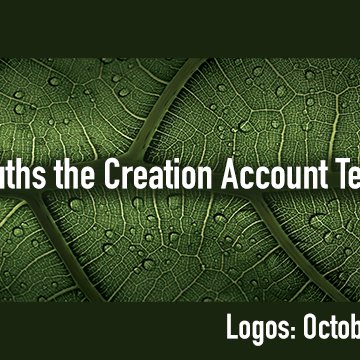
In every story, the beginning is essential. It is the beginning, the introduction of a story, that provides the foundation for everything that will follow. The same is true with the Bible. It is important to know the message of Genesis 1 to 3. This introduction serves as the foundation for the rest of the Bible. Let’s review the crucial truths that Genesis is trying to communicate.
Truth #1: God Exists
“In the beginning, God created the heavens and the earth” (Gen. 1:1).1 The first thing we discover when we read this text is that God exists. God is presented as the basis of existence itself. Everything exists solely because of Him. Thus, God’s existence is the foundation for all of the biblical worldview. Many theologians have noticed that Genesis seeks to show not only that God exists, but that there is no God other than Him.
Truth #2: God Is the Creator
The repetition of the expression “and God said” in the Genesis account emphasizes this point. Absolutely everything has its origin in God. Therefore, creation is presented as distinct from its Creator. Creation isn’t supernatural or divine. It shouldn’t be worshiped, but offers us reasons to worship the Creator, who is distinct from all of creation.
Truth #3: Humans Were Made to Resemble God, Not Animals
Genesis 1:26 informs us that the human race was created according to the “image” and “likeness” of God. Expressions like “image” and “likeness,” found in the Bible, “emphasize the nearness and relationship” between humans and their Creator.6 Our origin is found in a superior “Father,” not in a common animal ancestor.
Truth #4: Humans Were Made for Relationships
In Genesis 2:18 we find that God created human beings to live in community. “It is not good for the man to be alone,” He said. The fact that God blessed “male and female,” commanding them to be fruitful and multiply (Gen 1:27, 28) provides us with biblical truth that itself counters both contemporary and traditional human practices.
Truth #5: Humans Should Use Nature Wisely
Genesis also informs us about God’s command that humans not remain inactive but should rule over creation and take care of it. Genesis 1:26, 28 authorizes human beings to subdue the earth and rule over it. Through this divine command, we understand that human beings are allowed to use creation to meet their needs, so long as those needs are consistent with bringing glory to the Creator.
As bearers of the image of God, human beings should reflect His character in the treatment and care of creation. The resources created by God should be used wisely.
Truth #6: Sin (Disobeying God) Brings Death and Suffering
God is the objective source of all morality. He is the one who determines what is correct, just, and good. Therefore, disobedience to His will is considered breaking His standards. That is exactly what sin is. It is an attitude of rebellion against divine will.
Genesis helps us understand why our existence is characterized by so many flaws and problems.
Truth #7: God Has a Plan to Defeat Sin
The first chapters of Genesis help us understand the reason for the Old Testament sacrifices, the atoning sacrifice of Jesus, and the unfolding of the salvation plan. Genesis 2:17 makes it clear that the result of sin is death, and only through the death of the guilty one would divine justice be satisfied.
We conclude, therefore, that the creation account found in the first three chapters of the book of Genesis is crucial for the understanding of the rest of the biblical record, and of reality.
Adapted article from Adventist Review by Glauber Araujo, Editor at Brazilian Adventist Publishing House


